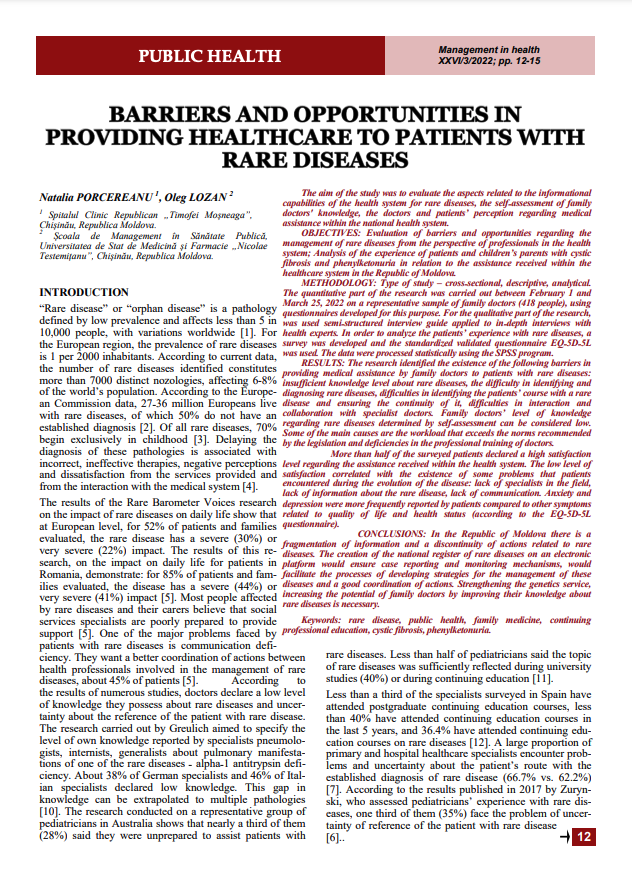Abstract
The aim of the study was to evaluate the aspects related to the informational capabilities of the health system for rare diseases, the self-assessment of family doctors' knowledge, the doctors and patients’ perception regarding medical assistance within the national health system.
OBJECTIVES: Evaluation of barriers and opportunities regarding the management of rare diseases from the perspective of professionals in the health system; Analysis of the experience of patients and children’s parents with cystic fibrosis and phenylketonuria in relation to the assistance received within the healthcare system in the Republic of Moldova.
METHODOLOGY: Type of study – cross-sectional, descriptive, analytical. The quantitative part of the research was carried out between February 1 and March 25, 2022 on a representative sample of family doctors (418 people), using questionnaires developed for this purpose. For the qualitative part of the research, was used semi-structured interview guide applied to in-depth interviews with health experts. In order to analyze the patients’ experience with rare diseases, a survey was developed and the standardized validated questionnaire EQ-5D-5L was used. The data were processed statistically using the SPSS program.
RESULTS: The research identified the existence of the following barriers in providing medical assistance by family doctors to patients with rare diseases: insufficient knowledge level about rare diseases, the difficulty in identifying and diagnosing rare diseases, difficulties in identifying the patients’ course with a rare disease and ensuring the continuity of it, difficulties in interaction and collaboration with specialist doctors. Family doctors’ level of knowledge regarding rare diseases determined by self-assessment can be considered low. Some of the main causes are the workload that exceeds the norms recommended by the legislation and deficiencies in the professional training of doctors. More than half of the surveyed patients declared a high satisfaction level regarding the assistance received within the health system. The low level of satisfaction correlated with the existence of some problems that patients encountered during the evolution of the disease: lack of specialists in the field, lack of information about the rare disease, lack of communication. Anxiety and depression were more frequently reported by patients compared to other symptoms related to quality of life and health status (according to the EQ-5D-5L questionnaire).
CONCLUSIONS: In the Republic of Moldova there is a fragmentation of information and a discontinuity of actions related to rare diseases. The creation of the national register of rare diseases on an electronic platform would ensure case reporting and monitoring mechanisms, would facilitate the processes of developing strategies for the management of these diseases and a good coordination of actions. Strengthening the genetics service, increasing the potential of family doctors by improving their knowledge about rare diseases is necessary.

